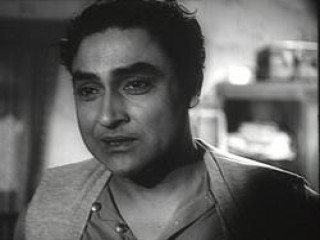
Ashok Kumar biography
Date of birth : 1911-10-13
Date of death : 2001-12-10
Birthplace : Bhagalpur, Bengal Presidency, British India
Nationality : Indian
Category : Arts and Entertainment
Last modified : 2011-06-29
Credited as : Bollywood actor, Filmfare Best Actor Award, Padma Bhushan
1 votes so far
He started his career in Bombay (Mumbai), albeit accidentally, with the Bombay Talkies production Jeevan Naiya in 1936. The male lead, Najam-ul-Hussain, went absconding with the heroine Devika Rani the director's wife who returned later. The director and studio head, Himanshu Rai, in retaliation dismissed the hero and called upon his laboratory assistant Ashok Kumar to take the part and thus began a six-decade-long acting career. However, it was his subsequent venture with Devika Rani in Achhut Kanya in the same year that set him up for the big league. The movie itself stands out as one of the heralding social dramas of pre-independence Indian film. It was the story of a Brahmin boy falling in love with a girl from the so called untouchables in Indian society. It was a big hit and started the trend of socially committed films.
Devika Rani and Ashok Kumar did a string of films after this including Izzat 1937, Savitri 1937 and Nirmala 1938. But she was the bigger star and Ashok Kumar was definitely in her shadow. He came into his own with three films opposite Leela Chitnis: KanGan in 1939, Bandhan in 1940, Jhoola in 1941, singing his own songs as was the custom then. He acquitted himself creditably and came away with several hits including most famously Main Ban ka Panchhi.
The traditional theatrical acting style and developed his own more natural style. He was also not afraid to take risks and was one of the first anti-heroes of Indian Cinema with his role in Kismet in 1943. This movie went on to create a record for the highest grossing film in India at the time of its release.
He produced several films for Bombay Talkies during the final years of the company including the famous Mahal in 1949 in which he co-starred with Madhubala. In the 1950s, he played the suave cigarette-smoking criminal or police officer in several films of what was the Indian film-noir movement. In the late 1960s he switched to character roles playing the parent, grandparent, dirty old man and suave criminal, being careful never to be typecast. He paired up 20 times with the queen of tragedy, and one of the best actresses ever seen in Bollywood, Meena Kumari, in films such as Parineeta, Bahu Begum, Pakeezah, Ek Hi Raasta, Bandish, Aarti and many more.
Awards:
1959 - Sangeet Natak Akademi Award
1962 - Filmfare Best Actor Award, Rakhi
1963 - Bengal Film Journalists' Association - Best Actor Award (Hindi), Gumrah
1966 - Filmfare Best Supporting Actor Award, Afsana
1969 - Filmfare Best Actor Award, Aashirwaad
1969 - National Film Awards for Best Actor, Aashirwaad
1969 - Bengal Film Journalists' Association - Best Actor Award (Hindi), Aashirwaad
1988 - Dadasaheb Phalke Award, India's highest award for cinematic excellence
1994 - Star Screen Lifetime Achievement Award
1995 - Filmfare Lifetime Achievement Award
1998 - Padma Bhushan
2001 - Awadh Samman by the Government of Uttar Pradesh
2007 - "Special Award" by Star Screen Awards
















